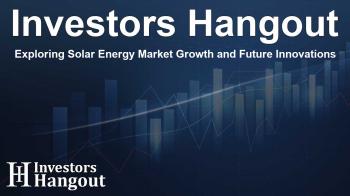Exploring Solar Energy Market Growth and Future Innovations

The Solar Energy Market: A Promising Future
The solar energy sector is set for a remarkable transformation, with an estimated growth of USD 5.46 billion from 2025 to 2029. This increase, driven predominantly by sunny climates and advancements in technology, reflects a significant shift towards renewable energy sources. The market, expected to expand at a CAGR of 38%, is increasingly influenced by Artificial Intelligence (AI), which redefines how solar energy is integrated into our daily lives.
The Driving Forces Behind Solar Energy Growth
Key factors propelling the growth of the solar energy market include the transition to a pay-as-you-go model and the competitive pricing of solar technologies. As concerns about climate change rise, the appeal of solar energy as a clean and sustainable resource grows stronger. It generates electricity through photovoltaic cells and concentrated solar power systems, which convert sunlight directly into usable energy.
Affordability and Accessibility
One of the crucial components of this market evolution is the declining costs of solar technology. Innovations in solar module materials, such as monocrystalline and polycrystalline silicon, have made solar energy systems more accessible to consumers and businesses alike. Moreover, financing options like the Pay-As-You-Go (PAYG) model allow households, particularly in off-grid regions, to install solar systems without the burden of hefty upfront costs. This approach nurtures an inclusive energy ecosystem and facilitates widespread adoption.
Market Segmentation and Analysis
The solar energy market encompasses various applications, categorizing systems into grid-connected and off-grid solutions. Grid-connected systems are integral to electricity distribution. They allow surplus energy to be redirected back to the grid, significantly improving energy efficiency. Meanwhile, off-grid solutions cater to remote areas, providing essential power in locations lacking conventional electricity infrastructure.
Challenges Facing the Solar Energy Sector
Despite its promising future, the solar energy market also faces significant challenges. The integration of solar power into existing energy networks necessitates robust infrastructure and investment. Additionally, the dependence on weather conditions can create variability in energy production, which poses challenges for reliability and grid stability. Innovations in energy storage solutions, such as advanced battery technologies, will play a crucial role in addressing these issues, ensuring a consistent power supply.
The Role of Companies in the Solar Revolution
Leading companies in the solar energy market, including ARTsolar Pty Ltd, Canadian Solar Inc., and JinkoSolar Holding Co. Ltd., are continually innovating to capture market share and optimize their offerings. These companies are focused on expanding solar installations, enhancing module efficiency, and implementing state-of-the-art technologies that aim to reduce costs and improve performance.
Regional Insights: A Global Perspective
Market growth is not confined to particular regions. Countries around the globe are increasingly embracing solar energy solutions as part of their energy strategies. For instance, initiatives promoting solar parks and decentralized rooftop installations in various regions aim at enhancing energy independence and sustainability. This trend is particularly notable in areas with abundant sunlight, making solar energy an attractive choice for both residential and commercial applications.
Looking Ahead: The Future of Solar Energy
The solar energy market is evolving rapidly, driven by technological advancements and changing consumer attitudes towards renewable energy. As improvements in energy efficiency, storage solutions, and grid integration continue, the sector is poised for sustained growth. The ongoing investment by governments and private players in solar technology further accelerates this transition, paving the way for a cleaner, more sustainable energy landscape.
Frequently Asked Questions
1. What factors are driving the growth of the solar energy market?
The main factors include improved technology, decreasing costs, favorable financing models like Pay-As-You-Go, and increasing awareness about climate change.
2. How does solar energy contribute to sustainability?
Solar energy generates electricity without emitting greenhouse gases, thereby helping to reduce our carbon footprint and mitigate climate change.
3. What are the main challenges faced by the solar energy sector?
Challenges include infrastructure needs for grid integration, reliability issues due to variability in energy production, and the high initial investment required for solar systems.
4. Who are the key players in the solar energy market?
Major companies in this area include ARTsolar Pty Ltd, Canadian Solar Inc., JinkoSolar Holding Co. Ltd., and many others that are leading in solar technology and market innovation.
5. What is the future outlook for solar energy?
With ongoing technological advancements and increasing investments, the solar energy market is expected to continue expanding, contributing significantly to the global energy mix.
About Investors Hangout
Investors Hangout is a leading online stock forum for financial discussion and learning, offering a wide range of free tools and resources. It draws in traders of all levels, who exchange market knowledge, investigate trading tactics, and keep an eye on industry developments in real time. Featuring financial articles, stock message boards, quotes, charts, company profiles, and live news updates. Through cooperative learning and a wealth of informational resources, it helps users from novices creating their first portfolios to experts honing their techniques. Join Investors Hangout today: https://investorshangout.com/
Disclaimer: The content of this article is solely for general informational purposes only; it does not represent legal, financial, or investment advice. Investors Hangout does not offer financial advice; the author is not a licensed financial advisor. Consult a qualified advisor before making any financial or investment decisions based on this article. The author's interpretation of publicly available data shapes the opinions presented here; as a result, they should not be taken as advice to purchase, sell, or hold any securities mentioned or any other investments. The author does not guarantee the accuracy, completeness, or timeliness of any material, providing it "as is." Information and market conditions may change; past performance is not indicative of future outcomes. If any of the material offered here is inaccurate, please contact us for corrections.
